An Analysis of Contours of a Bible-Based Christ-Centered Worldview
VerifiedAdded on 2020/03/23
|6
|1391
|214
Essay
AI Summary
This essay provides an in-depth analysis of a Bible-based, Christ-centered worldview, focusing on the authorship of Hosea and its significance. It delves into scholarly views, background information, and the purpose of the passage, emphasizing the importance of covenant theories and the Kingdom of God as major themes. The essay explores the eternal value of biblical themes, such as creation, redemption, and the mission of the Church, and their relevance to modern life. It highlights the unchanging nature of God and encourages self-reflection on the teachings of the passage, emphasizing faith, benevolence, and the hope for a place in the Kingdom of God. The conclusion underscores the importance of Hosea's teachings for the welfare of humanity, portraying God in His Divine form and inspiring readers to maintain their morale.
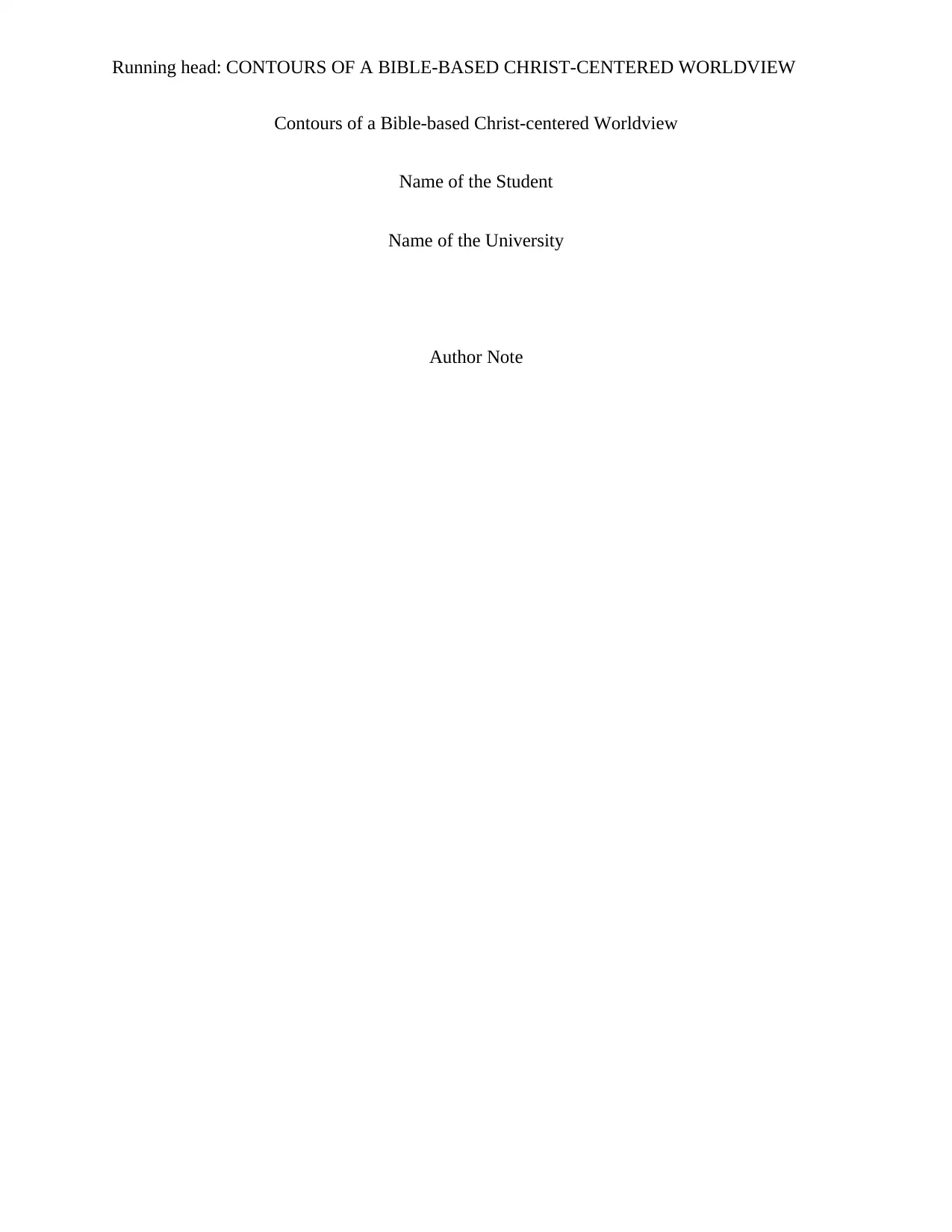
Running head: CONTOURS OF A BIBLE-BASED CHRIST-CENTERED WORLDVIEW
Contours of a Bible-based Christ-centered Worldview
Name of the Student
Name of the University
Author Note
Contours of a Bible-based Christ-centered Worldview
Name of the Student
Name of the University
Author Note
Paraphrase This Document
Need a fresh take? Get an instant paraphrase of this document with our AI Paraphraser
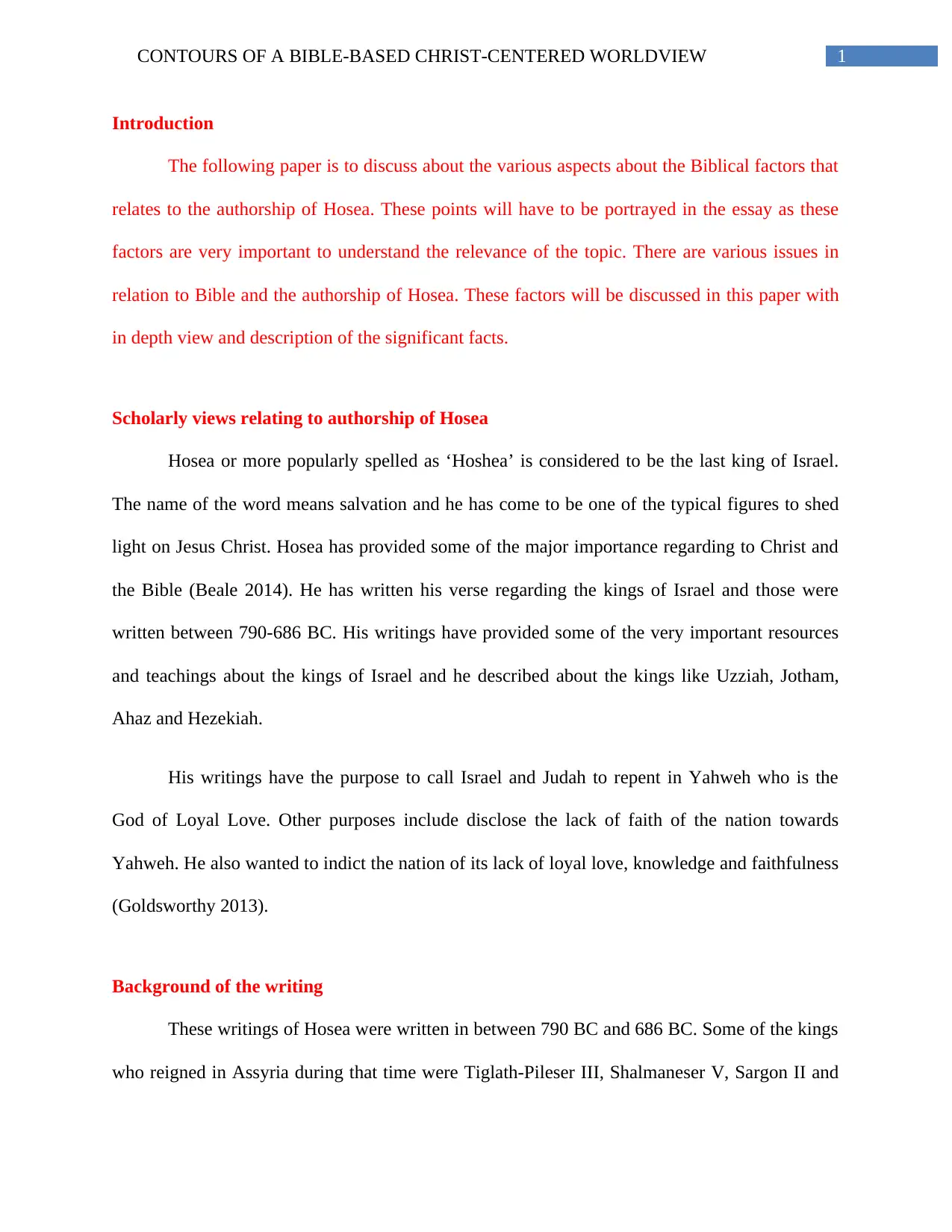
1CONTOURS OF A BIBLE-BASED CHRIST-CENTERED WORLDVIEW
Introduction
The following paper is to discuss about the various aspects about the Biblical factors that
relates to the authorship of Hosea. These points will have to be portrayed in the essay as these
factors are very important to understand the relevance of the topic. There are various issues in
relation to Bible and the authorship of Hosea. These factors will be discussed in this paper with
in depth view and description of the significant facts.
Scholarly views relating to authorship of Hosea
Hosea or more popularly spelled as ‘Hoshea’ is considered to be the last king of Israel.
The name of the word means salvation and he has come to be one of the typical figures to shed
light on Jesus Christ. Hosea has provided some of the major importance regarding to Christ and
the Bible (Beale 2014). He has written his verse regarding the kings of Israel and those were
written between 790-686 BC. His writings have provided some of the very important resources
and teachings about the kings of Israel and he described about the kings like Uzziah, Jotham,
Ahaz and Hezekiah.
His writings have the purpose to call Israel and Judah to repent in Yahweh who is the
God of Loyal Love. Other purposes include disclose the lack of faith of the nation towards
Yahweh. He also wanted to indict the nation of its lack of loyal love, knowledge and faithfulness
(Goldsworthy 2013).
Background of the writing
These writings of Hosea were written in between 790 BC and 686 BC. Some of the kings
who reigned in Assyria during that time were Tiglath-Pileser III, Shalmaneser V, Sargon II and
Introduction
The following paper is to discuss about the various aspects about the Biblical factors that
relates to the authorship of Hosea. These points will have to be portrayed in the essay as these
factors are very important to understand the relevance of the topic. There are various issues in
relation to Bible and the authorship of Hosea. These factors will be discussed in this paper with
in depth view and description of the significant facts.
Scholarly views relating to authorship of Hosea
Hosea or more popularly spelled as ‘Hoshea’ is considered to be the last king of Israel.
The name of the word means salvation and he has come to be one of the typical figures to shed
light on Jesus Christ. Hosea has provided some of the major importance regarding to Christ and
the Bible (Beale 2014). He has written his verse regarding the kings of Israel and those were
written between 790-686 BC. His writings have provided some of the very important resources
and teachings about the kings of Israel and he described about the kings like Uzziah, Jotham,
Ahaz and Hezekiah.
His writings have the purpose to call Israel and Judah to repent in Yahweh who is the
God of Loyal Love. Other purposes include disclose the lack of faith of the nation towards
Yahweh. He also wanted to indict the nation of its lack of loyal love, knowledge and faithfulness
(Goldsworthy 2013).
Background of the writing
These writings of Hosea were written in between 790 BC and 686 BC. Some of the kings
who reigned in Assyria during that time were Tiglath-Pileser III, Shalmaneser V, Sargon II and
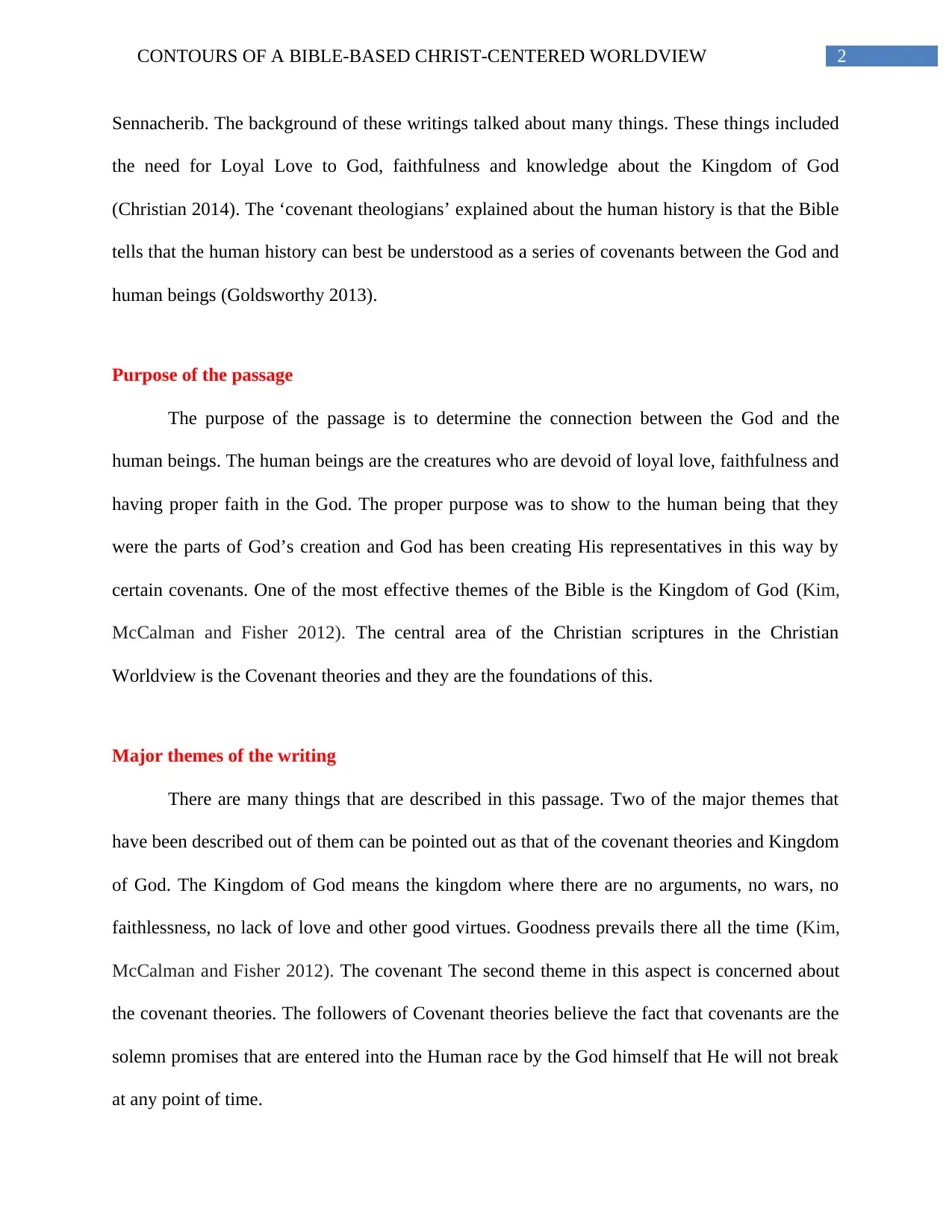
2CONTOURS OF A BIBLE-BASED CHRIST-CENTERED WORLDVIEW
Sennacherib. The background of these writings talked about many things. These things included
the need for Loyal Love to God, faithfulness and knowledge about the Kingdom of God
(Christian 2014). The ‘covenant theologians’ explained about the human history is that the Bible
tells that the human history can best be understood as a series of covenants between the God and
human beings (Goldsworthy 2013).
Purpose of the passage
The purpose of the passage is to determine the connection between the God and the
human beings. The human beings are the creatures who are devoid of loyal love, faithfulness and
having proper faith in the God. The proper purpose was to show to the human being that they
were the parts of God’s creation and God has been creating His representatives in this way by
certain covenants. One of the most effective themes of the Bible is the Kingdom of God (Kim,
McCalman and Fisher 2012). The central area of the Christian scriptures in the Christian
Worldview is the Covenant theories and they are the foundations of this.
Major themes of the writing
There are many things that are described in this passage. Two of the major themes that
have been described out of them can be pointed out as that of the covenant theories and Kingdom
of God. The Kingdom of God means the kingdom where there are no arguments, no wars, no
faithlessness, no lack of love and other good virtues. Goodness prevails there all the time (Kim,
McCalman and Fisher 2012). The covenant The second theme in this aspect is concerned about
the covenant theories. The followers of Covenant theories believe the fact that covenants are the
solemn promises that are entered into the Human race by the God himself that He will not break
at any point of time.
Sennacherib. The background of these writings talked about many things. These things included
the need for Loyal Love to God, faithfulness and knowledge about the Kingdom of God
(Christian 2014). The ‘covenant theologians’ explained about the human history is that the Bible
tells that the human history can best be understood as a series of covenants between the God and
human beings (Goldsworthy 2013).
Purpose of the passage
The purpose of the passage is to determine the connection between the God and the
human beings. The human beings are the creatures who are devoid of loyal love, faithfulness and
having proper faith in the God. The proper purpose was to show to the human being that they
were the parts of God’s creation and God has been creating His representatives in this way by
certain covenants. One of the most effective themes of the Bible is the Kingdom of God (Kim,
McCalman and Fisher 2012). The central area of the Christian scriptures in the Christian
Worldview is the Covenant theories and they are the foundations of this.
Major themes of the writing
There are many things that are described in this passage. Two of the major themes that
have been described out of them can be pointed out as that of the covenant theories and Kingdom
of God. The Kingdom of God means the kingdom where there are no arguments, no wars, no
faithlessness, no lack of love and other good virtues. Goodness prevails there all the time (Kim,
McCalman and Fisher 2012). The covenant The second theme in this aspect is concerned about
the covenant theories. The followers of Covenant theories believe the fact that covenants are the
solemn promises that are entered into the Human race by the God himself that He will not break
at any point of time.
⊘ This is a preview!⊘
Do you want full access?
Subscribe today to unlock all pages.

Trusted by 1+ million students worldwide
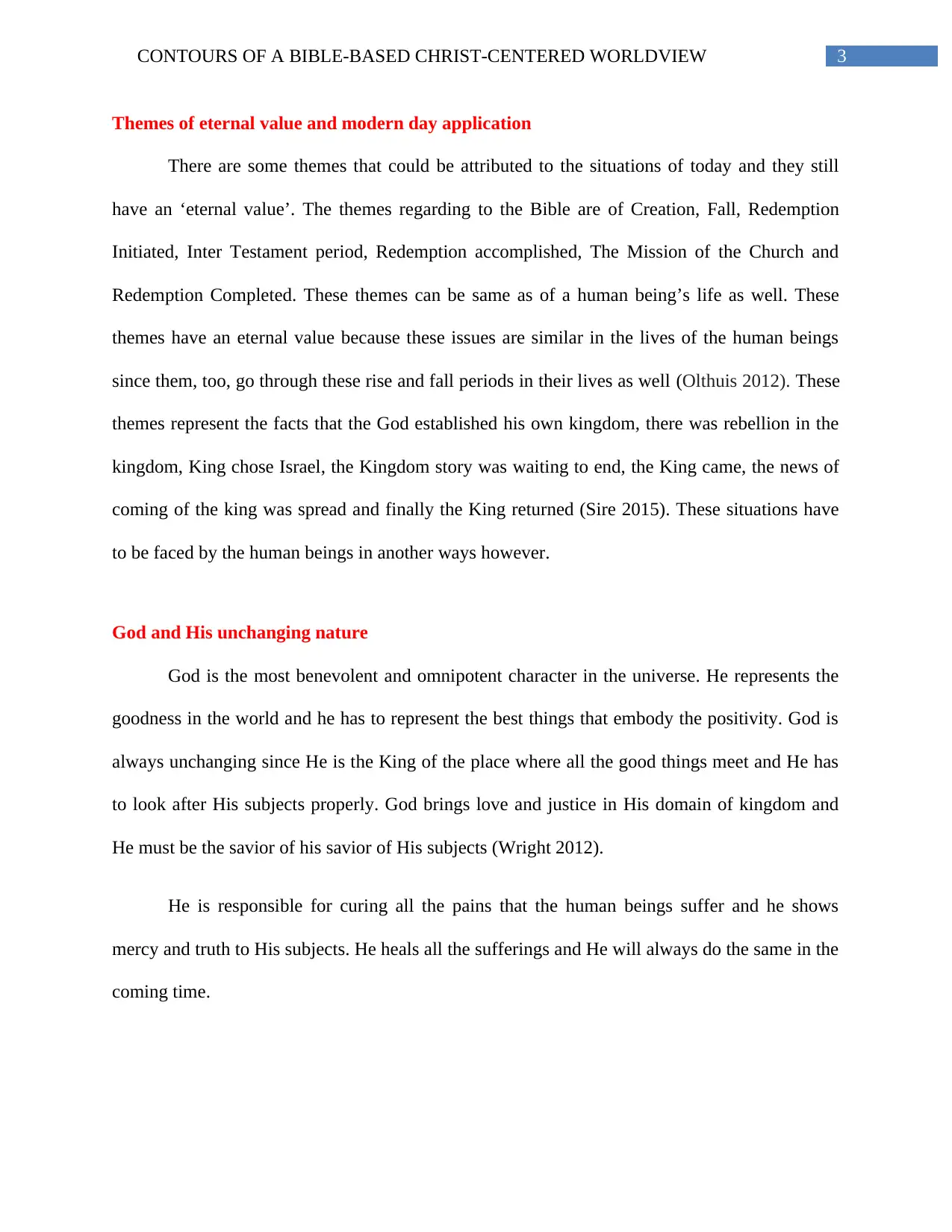
3CONTOURS OF A BIBLE-BASED CHRIST-CENTERED WORLDVIEW
Themes of eternal value and modern day application
There are some themes that could be attributed to the situations of today and they still
have an ‘eternal value’. The themes regarding to the Bible are of Creation, Fall, Redemption
Initiated, Inter Testament period, Redemption accomplished, The Mission of the Church and
Redemption Completed. These themes can be same as of a human being’s life as well. These
themes have an eternal value because these issues are similar in the lives of the human beings
since them, too, go through these rise and fall periods in their lives as well (Olthuis 2012). These
themes represent the facts that the God established his own kingdom, there was rebellion in the
kingdom, King chose Israel, the Kingdom story was waiting to end, the King came, the news of
coming of the king was spread and finally the King returned (Sire 2015). These situations have
to be faced by the human beings in another ways however.
God and His unchanging nature
God is the most benevolent and omnipotent character in the universe. He represents the
goodness in the world and he has to represent the best things that embody the positivity. God is
always unchanging since He is the King of the place where all the good things meet and He has
to look after His subjects properly. God brings love and justice in His domain of kingdom and
He must be the savior of his savior of His subjects (Wright 2012).
He is responsible for curing all the pains that the human beings suffer and he shows
mercy and truth to His subjects. He heals all the sufferings and He will always do the same in the
coming time.
Themes of eternal value and modern day application
There are some themes that could be attributed to the situations of today and they still
have an ‘eternal value’. The themes regarding to the Bible are of Creation, Fall, Redemption
Initiated, Inter Testament period, Redemption accomplished, The Mission of the Church and
Redemption Completed. These themes can be same as of a human being’s life as well. These
themes have an eternal value because these issues are similar in the lives of the human beings
since them, too, go through these rise and fall periods in their lives as well (Olthuis 2012). These
themes represent the facts that the God established his own kingdom, there was rebellion in the
kingdom, King chose Israel, the Kingdom story was waiting to end, the King came, the news of
coming of the king was spread and finally the King returned (Sire 2015). These situations have
to be faced by the human beings in another ways however.
God and His unchanging nature
God is the most benevolent and omnipotent character in the universe. He represents the
goodness in the world and he has to represent the best things that embody the positivity. God is
always unchanging since He is the King of the place where all the good things meet and He has
to look after His subjects properly. God brings love and justice in His domain of kingdom and
He must be the savior of his savior of His subjects (Wright 2012).
He is responsible for curing all the pains that the human beings suffer and he shows
mercy and truth to His subjects. He heals all the sufferings and He will always do the same in the
coming time.
Paraphrase This Document
Need a fresh take? Get an instant paraphrase of this document with our AI Paraphraser
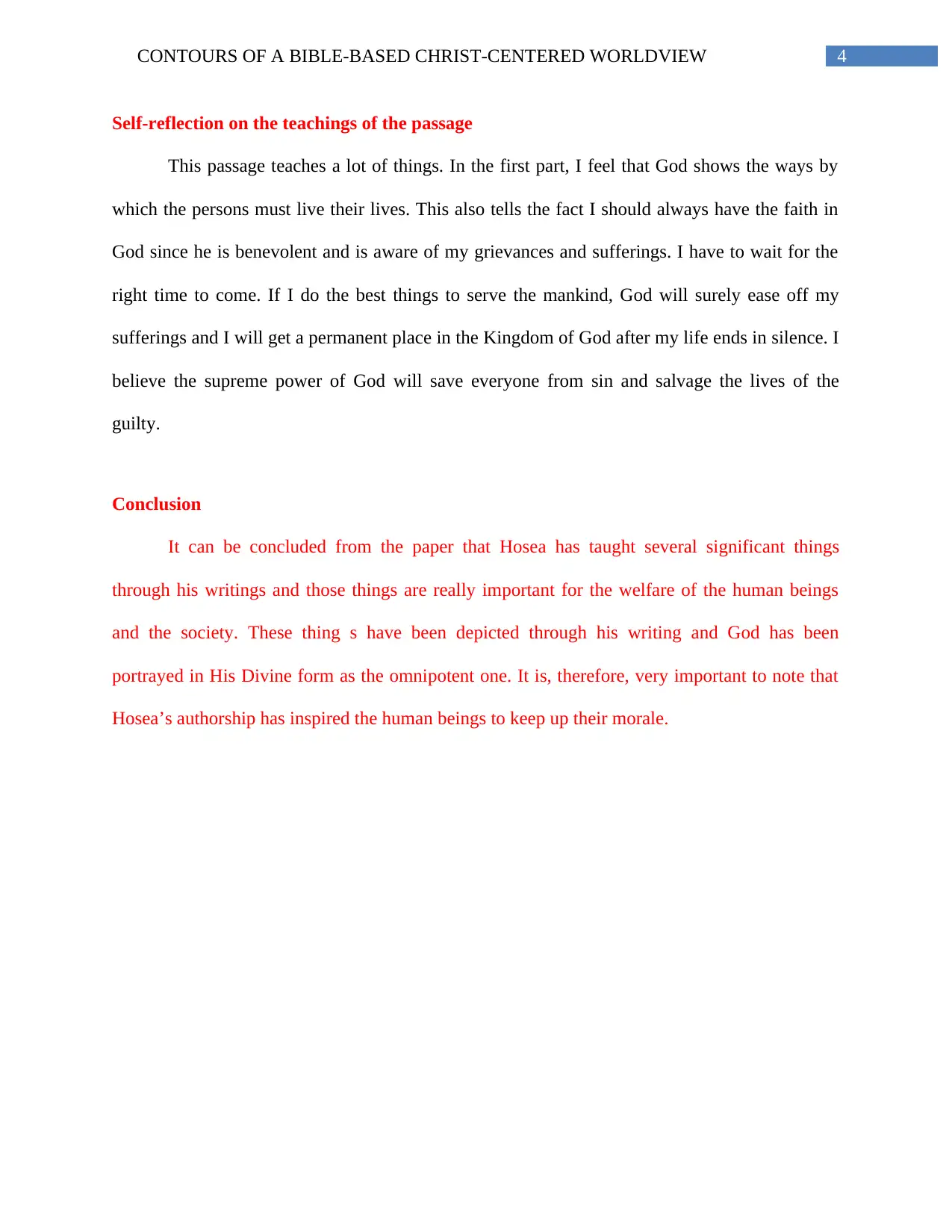
4CONTOURS OF A BIBLE-BASED CHRIST-CENTERED WORLDVIEW
Self-reflection on the teachings of the passage
This passage teaches a lot of things. In the first part, I feel that God shows the ways by
which the persons must live their lives. This also tells the fact I should always have the faith in
God since he is benevolent and is aware of my grievances and sufferings. I have to wait for the
right time to come. If I do the best things to serve the mankind, God will surely ease off my
sufferings and I will get a permanent place in the Kingdom of God after my life ends in silence. I
believe the supreme power of God will save everyone from sin and salvage the lives of the
guilty.
Conclusion
It can be concluded from the paper that Hosea has taught several significant things
through his writings and those things are really important for the welfare of the human beings
and the society. These thing s have been depicted through his writing and God has been
portrayed in His Divine form as the omnipotent one. It is, therefore, very important to note that
Hosea’s authorship has inspired the human beings to keep up their morale.
Self-reflection on the teachings of the passage
This passage teaches a lot of things. In the first part, I feel that God shows the ways by
which the persons must live their lives. This also tells the fact I should always have the faith in
God since he is benevolent and is aware of my grievances and sufferings. I have to wait for the
right time to come. If I do the best things to serve the mankind, God will surely ease off my
sufferings and I will get a permanent place in the Kingdom of God after my life ends in silence. I
believe the supreme power of God will save everyone from sin and salvage the lives of the
guilty.
Conclusion
It can be concluded from the paper that Hosea has taught several significant things
through his writings and those things are really important for the welfare of the human beings
and the society. These thing s have been depicted through his writing and God has been
portrayed in His Divine form as the omnipotent one. It is, therefore, very important to note that
Hosea’s authorship has inspired the human beings to keep up their morale.
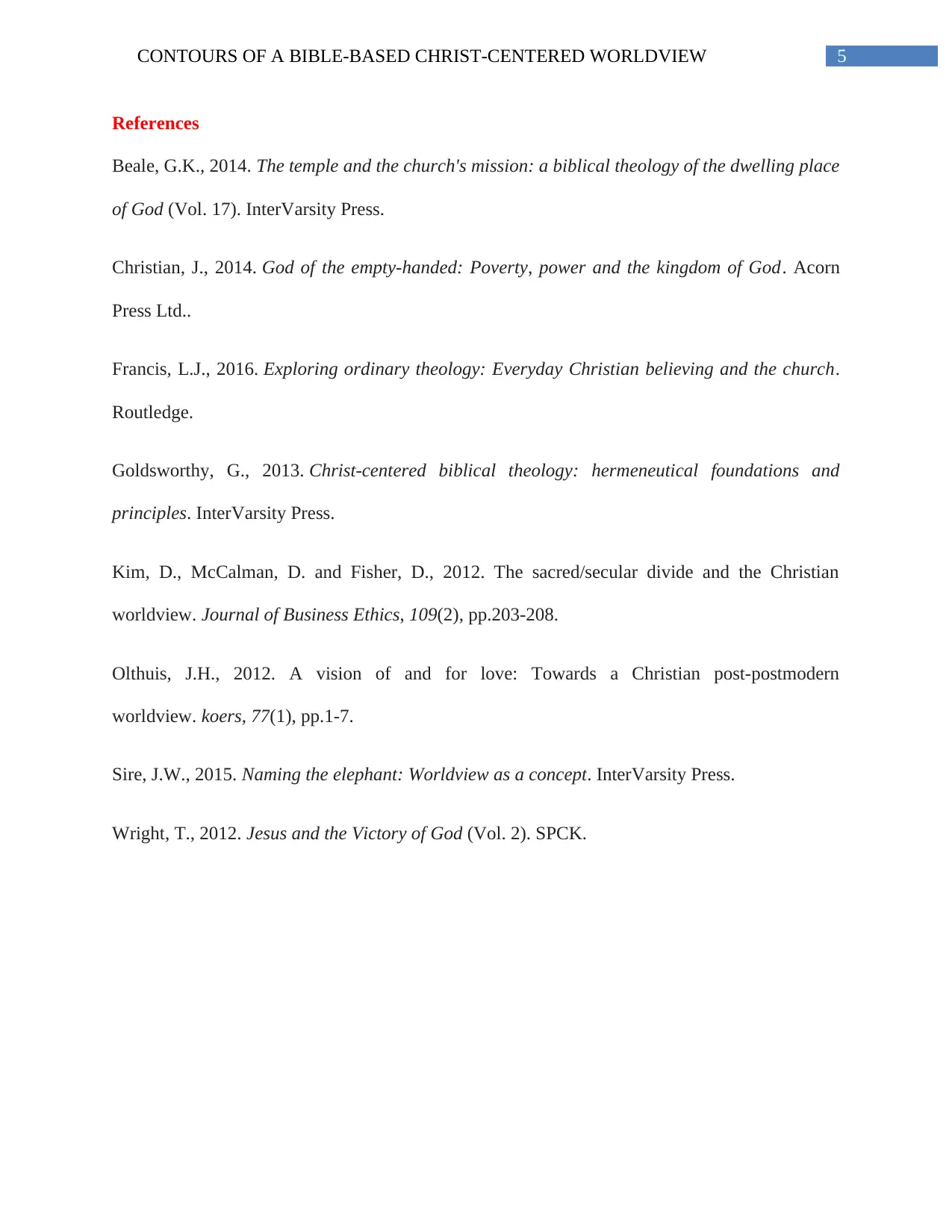
5CONTOURS OF A BIBLE-BASED CHRIST-CENTERED WORLDVIEW
References
Beale, G.K., 2014. The temple and the church's mission: a biblical theology of the dwelling place
of God (Vol. 17). InterVarsity Press.
Christian, J., 2014. God of the empty-handed: Poverty, power and the kingdom of God. Acorn
Press Ltd..
Francis, L.J., 2016. Exploring ordinary theology: Everyday Christian believing and the church.
Routledge.
Goldsworthy, G., 2013. Christ-centered biblical theology: hermeneutical foundations and
principles. InterVarsity Press.
Kim, D., McCalman, D. and Fisher, D., 2012. The sacred/secular divide and the Christian
worldview. Journal of Business Ethics, 109(2), pp.203-208.
Olthuis, J.H., 2012. A vision of and for love: Towards a Christian post-postmodern
worldview. koers, 77(1), pp.1-7.
Sire, J.W., 2015. Naming the elephant: Worldview as a concept. InterVarsity Press.
Wright, T., 2012. Jesus and the Victory of God (Vol. 2). SPCK.
References
Beale, G.K., 2014. The temple and the church's mission: a biblical theology of the dwelling place
of God (Vol. 17). InterVarsity Press.
Christian, J., 2014. God of the empty-handed: Poverty, power and the kingdom of God. Acorn
Press Ltd..
Francis, L.J., 2016. Exploring ordinary theology: Everyday Christian believing and the church.
Routledge.
Goldsworthy, G., 2013. Christ-centered biblical theology: hermeneutical foundations and
principles. InterVarsity Press.
Kim, D., McCalman, D. and Fisher, D., 2012. The sacred/secular divide and the Christian
worldview. Journal of Business Ethics, 109(2), pp.203-208.
Olthuis, J.H., 2012. A vision of and for love: Towards a Christian post-postmodern
worldview. koers, 77(1), pp.1-7.
Sire, J.W., 2015. Naming the elephant: Worldview as a concept. InterVarsity Press.
Wright, T., 2012. Jesus and the Victory of God (Vol. 2). SPCK.
⊘ This is a preview!⊘
Do you want full access?
Subscribe today to unlock all pages.

Trusted by 1+ million students worldwide
1 out of 6
Your All-in-One AI-Powered Toolkit for Academic Success.
+13062052269
info@desklib.com
Available 24*7 on WhatsApp / Email
![[object Object]](/_next/static/media/star-bottom.7253800d.svg)
Unlock your academic potential
Copyright © 2020–2026 A2Z Services. All Rights Reserved. Developed and managed by ZUCOL.
